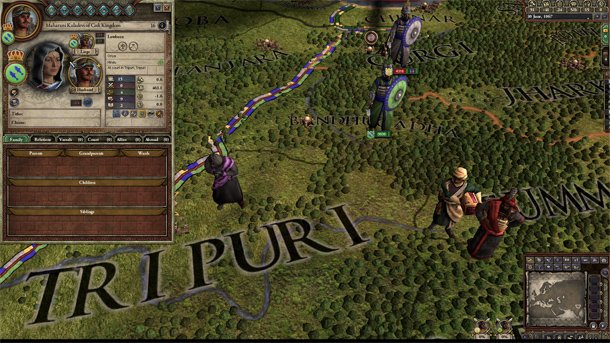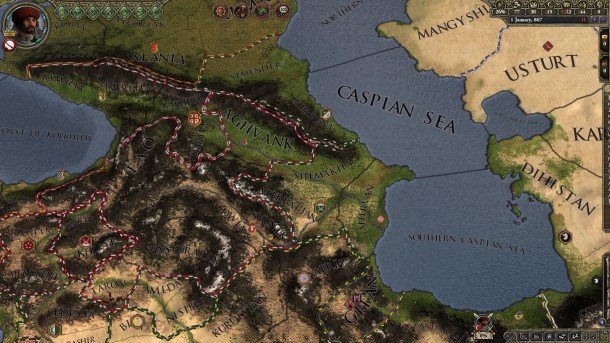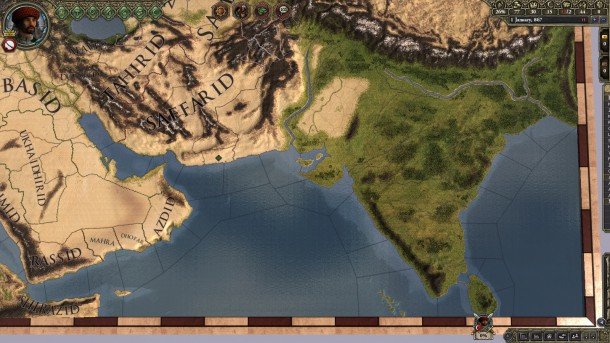
Crusader Kings II: Rajas of India releases this Tuesday , expanding the map of Paradox's medieval strategy sandbox to central Asia and the Indian subcontinent. Not one to venture into strange, new lands unprepared, I met with CK2 lead designer Henrik Fåhraeus to learn everything there was to know about what lies in wait with this expansion. We talked about historical accuracy, India's religions and castes, and more. If you promise not to plot my untimely death, you can share in my findings below.
PC Gamer: I guess the highlight of the new expansion is the map expansion and the new religions. What can you tell us about them, in general?
Henrik Fahraeus: So, there are three new religions in India. They are in a new religion group, which is basically the Indian group: the Dharma. The Dharma Initiative. [laughs]
PCG: [Laughs] I hope Crusader Kings never goes in that direction.
[Both Laugh]
PCG: Europe vanishes. Reappears somewhere else. [Laughs]
HF: So we tried to make them as different and interesting as possible to play. Pretty obviously we're going to add a lot of events and decisions and stuff like that to make it feel like you're playing in India. So you don't have a tournament. You might have a tiger hunt, or something like that.
Keep up to date with the most important stories and the best deals, as picked by the PC Gamer team.
One thing I wanted to do myself is playing off the concept of karma and reincarnation. A baby is born. It has a scar, and it looks exactly the same as my grandfather's scar. So everyone thinks, hey, this is the reincarnation of Ashoka the Great . And as the kid grows up, it might acquire traits similar to the ones my grandfather had. And everyone will think it's the reincarnation. Of course, it's up to the player to decide whether that's true or not.
PCG: That's an interesting point that has been discussed in light of some of the events—particularly one that you wrote for Sons of Abraham. There is sort of this tongue-and-cheek supernatural element to some of the newer content in Crusader Kings II. Is that a direction you guys are comfortable with pushing further? Have you ever been afraid that it might hurt the game's reputation for historical accuracy?
HF: I think that even most people in the historical accuracy corner are willing to forgive a sprinkling of this type of content in Crusader Kings II. I tend to justify it to myself by thinking of how religious and superstitious people were in medieval times. Magical thinking was the norm, not the exception. That said, in most cases we try to keep the door open for natural explanations. (As an aside, in the case of reincarnation, I try to keep an open mind. There is actually a surprising amount of scientific evidence for it. See Ian Stevenson, particularly his work on birthmarks.
PCG: What are the main ways the Indian religions will play differently from the existing ones?
HF: Right. Since the Indian religions are so tolerant and pluralistic, which makes them very different from the European religions, they won't have any heresies. And they're very tolerant of each other. There is some friction, but these penalties will be much lower. If I'm a Buddhist ruler, and all of my vassals are Hindu, they will be fairly okay with that.

PCG: How hard is it to switch castes?
HF: It depends. It is fairly easy to take a step down; by marrying someone of a lower caste your children will be of that caste. It is much harder to become Kshatriya (which is the optimal caste for feudal lords); there is a decision you can take at any time, but it costs a lot of money and piety, especially if your Learning skill is low (it's easier to argue with the Brahmins if you know your Vedas).
PCG: How is marrying between castes handled?
HF: You are free to marry anyone, but children inherit the lower of their parents' castes. Of course, marrying "down" causes a loss of prestige, and vice versa.
PCG: Since the Indian religions don't have heresies, how will they interact with things like Moral Authority?
HF: Like Pagans, Moral Authority is not hugely important for the Indian religions, but low authority can trigger a number of negative province events—temple corruption, death cults, and so on.
PCG: Historically, there were divisions among these more Asian religions. You had the Theravada and Vajrayana… will those be modeled at all through traits and events, in lieu of heresies? You know, something like the Ashari and Mu'tazili schools for Muslims?
HF: Yes, absolutely. These sects or branches are represented as inherited traits—Shaivist, Vaishnavist, Shaktist—each with its own modifiers. Like religions, these can change when children are educated. In addition, there are many character modifiers for your "patron god," which you are allowed to change, of course.
PCG: Are the Indian religions more tolerant of… is it all religions, or just other Indian religions?
HF: All religions, but to a larger degree with the other Indian religions.
PCG: Do they all feel roughly the same within the Indian religion group, kind of like the different flavors of pagan, or will they have more varied mechanics?
HF: So the way that we're representing these religions is that the Hindu are the more warlike ones. We know from historical sources that they raided their neighbors a lot. They will have kind of aggressive cassus belli , parallel to the Holy War CB but a little bit different. They will also have the caste system.
The Buddhists are the learned scholars, the gurus, of the three religions, so they will have a technological bonus. In reality, they were probably mostly concerned with theological and philosophical issues. But it seems natural, since they created these massive university complexes on the Bengal.
The Jainists are the peaceniks. They are more pacifistic than the other two, but also extremely internally stable. Vassals as well as the provinces will not cause much problem due to differences of religion, basically.

PCG: It sounds like the Jain religion is very powerful. I mean, Crusader Kings is a game about keeping your realm stable. That's almost a bigger challenge than dealing with your neighbors. And if they get huge bonuses to that, how do you balance it out?
HF: Well, their CBs will suck. They will basically not be able to attack anyone. So that's the downside.
PCG: Decadence for Muslims is going to be changed in the free patch along with Rajas. Can you tell us what you plan on doing with it?
HF: The way it works now is, characters acquire the Decadent trait. They sort of become decadent. And it's much more likely that they get this trait if they are unlanded. And it's much more likely if they are already Hedonists or Gluttonous or something like that. And then, you can no longer just imprison your family members for free. I just removed that whole thing. Instead, you can try to convince them… negotiate with them about their behavior. That starts a little chain, and eventually, if they refuse, then you can imprison them.
So there will be fewer decadent characters, and more ways of dealing with them. It feels a bit unnatural that you would just exterminate your entire dynasty all the time.
PCG: With the addition of war elephants for India and camel warriors in North Africa, do you plan to use the new special troop system to give other existing cultures new things to play with in the future?
HF: Absolutely. That is the idea. This is just the start of the development of that system. One thing we didn't have time to add was special troop type attrition in different terrains. I still want to do that. For example, historically, the Mongols were stopped by the Mamelukes, because Mongol riders didn't fight well in the sort of gravelly, desert-type terrain. So camel riders kind of outdid them.
Len Hafer is a freelancer and lifelong PC gamer with a specialty in strategy, RPGs, horror, and survival games. A chance encounter with Warcraft 2: Tides of Darkness changed her life forever. Today, her favorites include the grand strategy games from Paradox Interactive like Crusader Kings and Europa Universalis, and thought-provoking, story-rich RPGs like Persona 5 and Disco Elysium. She also loves history, hiking in the mountains of Colorado, and heavy metal music.

